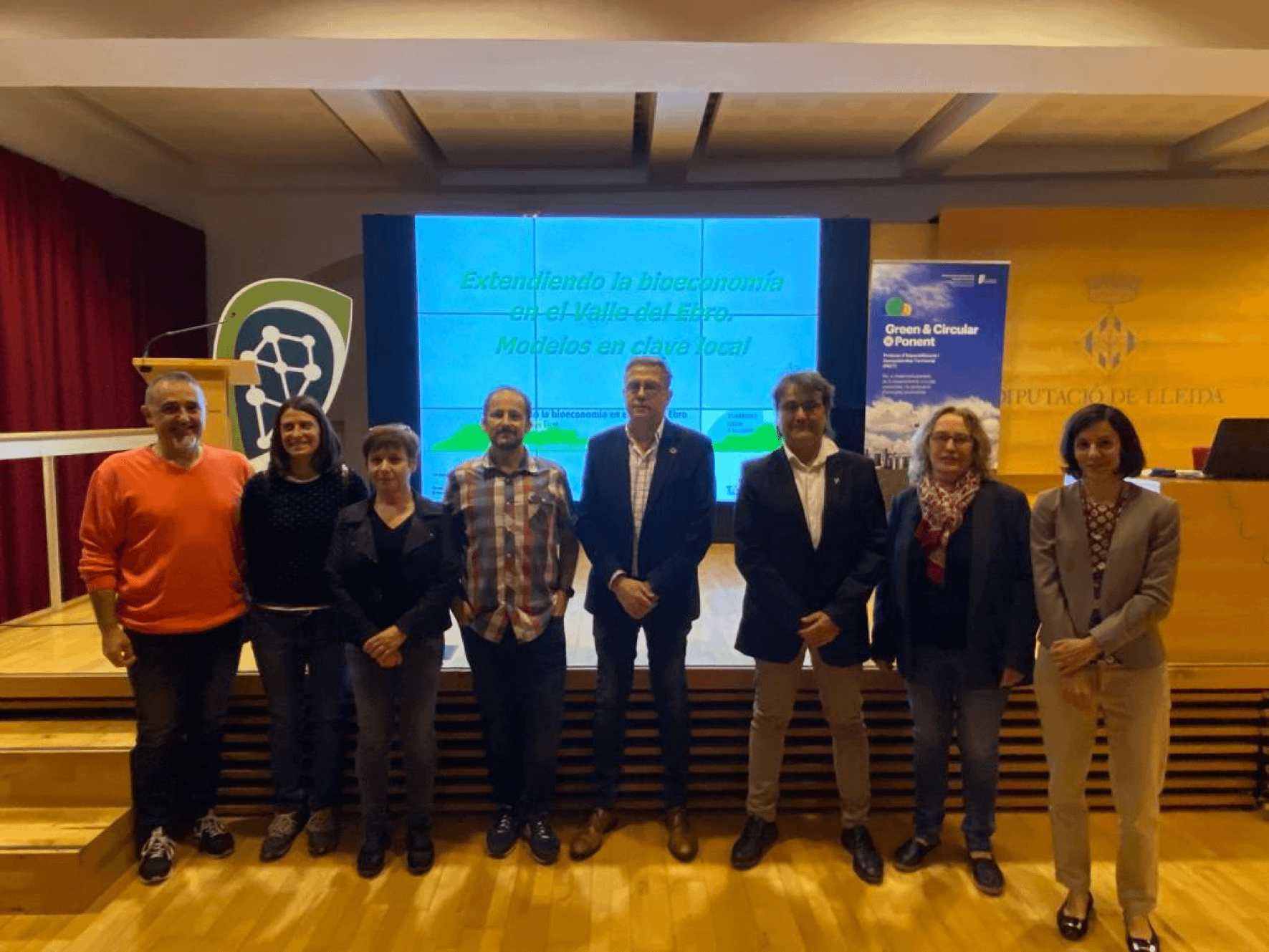A BRANCHES WORKSHOP IN LLEIDA AND ALCARRÁS
16 May 2023
More than 50 key actors from La Rioja, Navarra, Aragon and Catalonia met to discuss and set a milestone in inter-territorial collaboration to promote local actions to boost the use of agricultural, livestock and forestry waste and resources. The INtercamBIOM network and the BRANCHES project were present as part of the driving initiatives.
The starting point is the following vision: Circularity applied to agricultural and livestock organic waste represents an opportunity for the rural territories of the Ebro Valley, disimpacting their management and generating new businesses. In this context, it is often difficult to implement local and rural initiatives. However, there are initiatives that can show the way. And to generate more movement and replication it is necessary to put the key territorial key actors in contact with each other and facilitate the exchange of information.
This shared vision has driven the workshop, a collaboration between several projects and entities (see below), in which more than 50 key actors from the territories of the Ebro Valley have participated.
The day included an initial reception and opening with project presentations, a show case visit to a circularity success story, and a dialogue workshop followed by a networking lunch (see programme).
OPENING: the voice of 5 initiatives
The meeting was inaugurated in the events hall of the Diputació de Lleida, with the intervention of its president, Joan Talarn Gilabert, who, in addition to highlighting the value of the meeting, urged that this be a starting point for future inter-territorial forums and collaborations.Subsequently, the 5 organising initiatives took the floor, highlighting their lines of action to promote the advancement of the rural bioeconomy:
- Lleida Provincial Council, emphasising the importance of the open and collaborative innovation model for the promotion of the bioeconomy as a vector of territorial competitive specialisation (Green&Circular Project).
- The University of Lleida, through the necessary training for a new generation of entrepreneurs in agricultural and livestock circular economy (Erasmus+ TANGO Project).
- AVEBIOM - Spanish Biomass Association, highlighting the role of knowledge exchange networks and the creation of a European Rural Bioeconomy Network (BRANCHES and BIORURAL projects).
- The Centre for Innovation in Rural Bioeconomy - CITA Teruel, headquarters of the Centre for Agri-Food Research and Technology of Aragon (CITA), has shared its implementation of participatory dialogue to generate solutions and pilots through the AgriFoodTe Teruel AgriFood Knowledge and Innovation Network (AKIS).
- The INNOVARUM consultancy firm, stressing the need to encourage the promotion of small-scale solutions that favour the deployment of the bioeconomy in rural areas (MainstreamBIO project).
DOWNLOAD PRESENTATIONS (PDF format): HERE
Show case visit to SAT Alcarrás Bioproductors
Afterwards, the participants visited the SAT Alcarrás Bioproductors to learn the details of its origin, its initial vision, and how it has been the path to concretion and success. This is a disruptive project, which brings together 150 livestock farming families representing more than 400 farms and which has been able to articulate collective action to make effective the valuation of livestock waste and other waste from primary sector activity, innovating with technology and management and business models. Changing the "linearity of manure-field" for "value and circularity" through compost, which has opened the way to go further, for the future use of biogas and biomethane, and the production of biofertilisers.
More info on this initiative: HERE
Workshop and dialogue: adoption needs to be speeded up
Afterwards, the attendees travelled to Alcarrás to hold a dialogue and a networking lunch.
There was a dialogue on the difficulties of starting up new businesses in the bioeconomy on a local scale, due to factors such as the lack of vision of small companies, livestock farmers, farmers or local entrepreneurs, lack of knowledge of success stories or technologies, uncertainty in investment, or in the market launch of the new bioproduct or service. This can take up to 10 or 20 years to develop, which is why support mechanisms, information, connection, mentoring, etc. are all the more necessary.
There were multiple and plural voices, but among the various points of action, the richness of sharing experiences to replicate models and territorial policies that have borne fruit in other contexts has been highlighted, to accelerate the challenge of putting circularity into practice, framed in the rural, nearby, and through innovation and value. And for this, the Ebro Valley corridor is a rich and diverse territorial framework in which to speed up this transfer.
More info on dialogue outcomes: DOCUMENT PENDING
Final feeling: looking forward to growing and repeating this experience.
At the end of the workshop, the participants shared their impressions of the day, and there was unanimous agreement on the value provided, and that it was a format and experience to be repeated. There was also an interest in being connected as individuals, not only as a group, because of the multiple synergies that the meeting can generate.
Thus, new meetings are on the near horizon in order to continue sharing initiatives and formulas that enable the development of new applications of circularity and bioeconomy in rural areas.
Link to News in Spanish: https://intercambiom.org/2023/05/16/lleida-y-alcarras-marcan-un-hito-el-21-de-abril-en-pos-de-la-bioeconomia-local-y-circular-del-valle-del-ebro/

